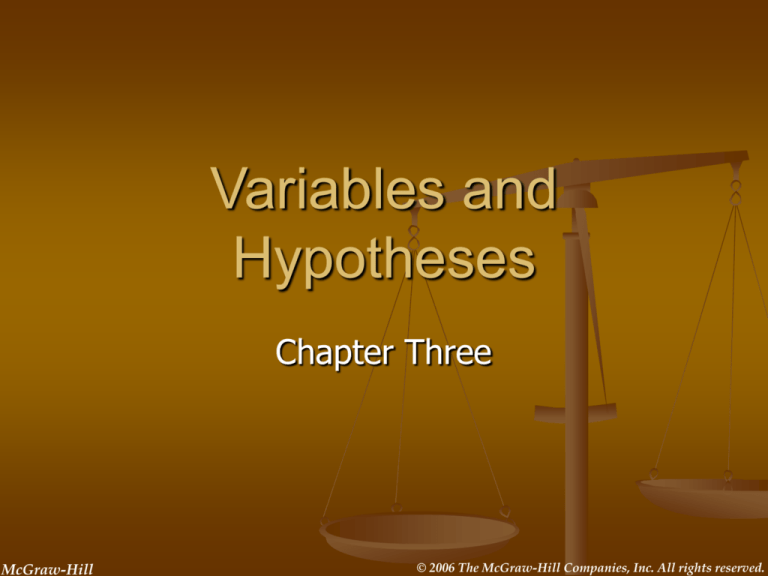
Variables and
Hypotheses
Chapter Three
McGraw-Hill
© 2006 The McGraw-Hill Companies, Inc. All rights reserved.
Variables and Hypotheses
Chapter Three
McGraw-Hill
© 2006 The McGraw-Hill Companies, Inc. All rights reserved.
What is a Variable?
A variable is a variation within a class of objects (i.e.,
eye color).
A constant is a characteristic with no variations
within a class of objects (i.e., grade level of ninth
graders).
Researchers choose certain variables to study since
they are suspected to be related to a possible
relationship to be discovered.
McGraw-Hill
© 2006 The McGraw-Hill Companies, Inc. All rights reserved.
Quantitative vs. Categorical Variables
Variables are classified as either quantitative
or categorical
A quantitative variable is conceptualized and
analyzed in distinct categories, with no
continuum implied (i.e., height).
Can be subdivided into smaller units
A categorical variable does not vary in degree,
amount, or quantity, but are qualitatively
different (i.e., political party).
McGraw-Hill
There is no middle ground or in-between
measurement
© 2006 The McGraw-Hill Companies, Inc. All rights reserved.
Quantitative vs. Categorical Variables (Figure 3.1)
McGraw-Hill
© 2006 The McGraw-Hill Companies, Inc. All rights reserved.
Independent vs. Dependent Variables
The independent variable is what the researcher studies
to see its relationship or effects.
The dependent variable is what is being influenced or
affected by the independent variable
Presumed or possible cause
Presumed results
Independent variables may be either manipulated or
selected
McGraw-Hill
A manipulated variable is a changed condition the researcher
creates during a study, also known as an experimental or
treatment variable
A selected variable is an independent variable that already
exists
© 2006 The McGraw-Hill Companies, Inc. All rights reserved.
The Relationship between
Independent and Dependent
Variables
McGraw-Hill
© 2006 The McGraw-Hill Companies, Inc. All rights reserved.
Other Types of Variables
Outcome Variable
A dependent variable that is quantitative
Most studies demonstrating this would have a
categorical independent variable
The investigator is interested in the effects that
might lead to differences in methods = outcomes
Moderator Variable
McGraw-Hill
Special type of independent variable
Selected to determine if it affects (modifies) the
basic relationship between the primary independent
variable and the dependent variable (Figure 3.2)
© 2006 The McGraw-Hill Companies, Inc. All rights reserved.
Other Types of Variables
(cont.)
Extraneous Variable
McGraw-Hill
Independent variables that have not been controlled
Considered a basic problem in research
The task is to control these variables by reducing or
eliminating their effects
A method to control extraneous variables is to hold
them constant
Figure 3.3 illustrates the importance of identifying
extraneous variables
© 2006 The McGraw-Hill Companies, Inc. All rights reserved.
Examples of Extraneous Variables (Figure 3.3)
McGraw-Hill
© 2006 The McGraw-Hill Companies, Inc. All rights reserved.
What is a Hypothesis?
A hypothesis is a prediction regarding the possible
outcome of a study
Advantages of stating hypotheses include:
Forces us to think more deeply and specifically about the
possible outcomes of the study
Enables us to make specific predictions based on prior evidence
or theoretical argument
Helps to clarify whether we are or aren’t investigating a
relationship
Disadvantages of stating hypotheses include:
McGraw-Hill
May lead to a bias on the part of the researcher
In some studies, it would be presumptuous to predict what
findings would be
Focusing on the hypothesis could prevent the researcher from
seeing other phenomena that might be important to the study
© 2006 The McGraw-Hill Companies, Inc. All rights reserved.
Hypotheses from a Single Research Question
(Figure 3.4)
McGraw-Hill
© 2006 The McGraw-Hill Companies, Inc. All rights reserved.
Directional vs. Non-directional
Hypotheses
A directional hypothesis is one in which the researcher indicates the
specific direction that he or she expects will emerge in a relationship
in the study.
The direction is based on what the researcher has found from:
Literature
Personal experiences
Experience from others
A non-directional hypothesis is when there is no specific prediction
about what direction the outcome of a study will take.
Sometimes it is difficult to make specific predictions upon a study
McGraw-Hill
A study may state that it would point to non-specific directions vs. distinct
possibilities
© 2006 The McGraw-Hill Companies, Inc. All rights reserved.
Directional vs. Non-Directional
Hypotheses (Figure 3.5)
McGraw-Hill
© 2006 The McGraw-Hill Companies, Inc. All rights reserved.






